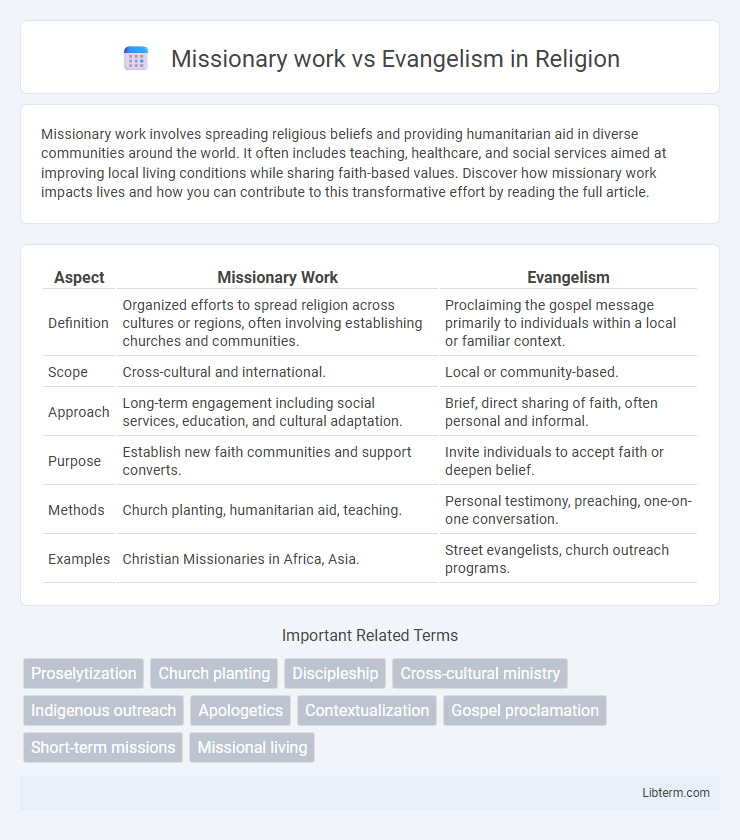Missionary work involves spreading religious beliefs and providing humanitarian aid in diverse communities around the world. It often includes teaching, healthcare, and social services aimed at improving local living conditions while sharing faith-based values. Discover how missionary work impacts lives and how you can contribute to this transformative effort by reading the full article.
Table of Comparison
| Aspect | Missionary Work | Evangelism |
|---|---|---|
| Definition | Organized efforts to spread religion across cultures or regions, often involving establishing churches and communities. | Proclaiming the gospel message primarily to individuals within a local or familiar context. |
| Scope | Cross-cultural and international. | Local or community-based. |
| Approach | Long-term engagement including social services, education, and cultural adaptation. | Brief, direct sharing of faith, often personal and informal. |
| Purpose | Establish new faith communities and support converts. | Invite individuals to accept faith or deepen belief. |
| Methods | Church planting, humanitarian aid, teaching. | Personal testimony, preaching, one-on-one conversation. |
| Examples | Christian Missionaries in Africa, Asia. | Street evangelists, church outreach programs. |
Defining Missionary Work and Evangelism
Missionary work involves long-term efforts to establish and nurture faith communities, often including social, educational, and humanitarian initiatives. Evangelism primarily focuses on the immediate proclamation of the gospel to individuals with the goal of conversion and personal faith commitment. Both activities aim to spread Christianity but differ in scope, approach, and duration.
Historical Roots and Evolution
Missionary work and evangelism both trace their origins to the early Christian church, with missionary efforts primarily aimed at spreading Christianity across cultural and geographical boundaries, often through establishing churches and communities. Evangelism focuses more on personal proclamation of the Gospel and individual conversion, rooted in the New Testament teachings of Jesus and the apostles. Over centuries, missionary work evolved into organized global missions driven by colonial expansion, while evangelism adapted through revivals and modern media emphasizing personal faith and outreach.
Key Objectives and Approaches
Missionary work focuses on long-term cultural immersion and community development to establish sustainable faith communities, often involving social services and education as strategic approaches. Evangelism prioritizes spreading the gospel message rapidly through preaching, personal witnessing, and outreach events designed to inspire immediate faith decisions. Both aim to expand Christian influence but differ in scope, with missionary work emphasizing relational building and evangelism emphasizing proclamation.
Geographic and Cultural Outreach
Missionary work emphasizes long-term geographic and cultural immersion, often involving relocation to different countries or remote regions to establish lasting community ties and promote religious teachings within diverse cultural contexts. Evangelism primarily targets immediate cultural outreach through local or regional efforts, focusing on spreading messages and converting individuals within familiar cultural boundaries. Both approaches leverage tailored communication strategies to respect cultural sensitivities while expanding religious influence across various geographic settings.
Methods of Spreading the Message
Missionary work often involves establishing long-term relationships and community development projects to share the Christian faith, emphasizing cultural adaptation and sustained presence. Evangelism primarily focuses on direct proclamation of the gospel through preaching, personal testimony, and mass outreach events aimed at immediate conversion. Both methods utilize media technologies, but missionary work tends to engage in holistic service, while evangelism seeks rapid message dissemination.
Training and Preparation Differences
Missionary work involves extensive cross-cultural training to equip individuals with language skills, cultural understanding, and contextual theology for effective long-term engagement. Evangelism training emphasizes developing personal communication skills, biblical knowledge, and relational approaches suited for immediate, often local, outreach. Missionary preparation prioritizes adaptability and sustainability in diverse environments, while evangelism focuses on rapid, impactful message delivery.
Challenges and Obstacles Faced
Missionary work often encounters challenges such as cultural barriers, language differences, and resistance from local communities, which complicate the establishment of trust and long-term relationships. Evangelism faces obstacles including misinterpretation of messages, limited access to diverse audiences, and backlash from religious or political groups opposing conversion efforts. Both fields require strategic communication, cultural sensitivity, and adaptation to overcome opposition and effectively share their religious messages.
Impact on Local Communities
Missionary work often involves long-term engagement focused on holistic development, including education, healthcare, and economic support, fostering sustainable growth in local communities. Evangelism primarily centers on spreading religious messages and converting individuals, which can influence cultural and social dynamics by reshaping community values and practices. Both approaches impact local communities differently, with missionary work promoting broader socio-economic advancement and evangelism driving spiritual transformation.
Measuring Success and Effectiveness
Measuring success in missionary work often involves evaluating long-term community transformation, sustained church planting, and holistic social impact, while evangelism success is typically assessed through immediate metrics like the number of conversions and attendance at evangelistic events. Missionary effectiveness is gauged by the establishment of self-sustaining local ministries and integration of cultural sensitivity, whereas evangelism effectiveness prioritizes message clarity and reach across diverse audiences. Both require tailored criteria to reflect their distinct goals: deep relational influence versus broad spiritual outreach.
Future Trends in Missionary Work and Evangelism
Advancements in digital technology and social media platforms are driving future trends in missionary work and evangelism, enabling global outreach and interactive engagement across diverse cultures. Data analytics and artificial intelligence are increasingly utilized to tailor evangelistic messages, enhancing the personalization and effectiveness of religious communication. Collaborative online networks and virtual reality experiences are expected to transform traditional missionary methods, fostering immersive spiritual connections beyond geographical boundaries.
Missionary work Infographic

 libterm.com
libterm.com